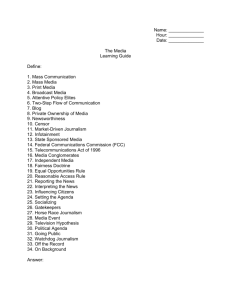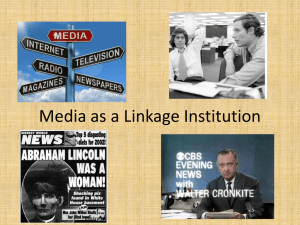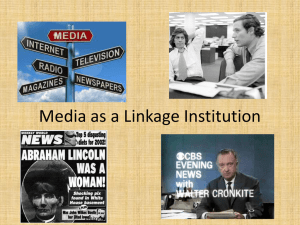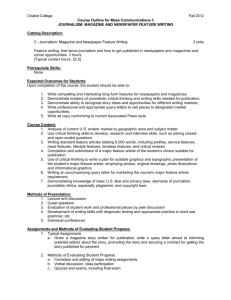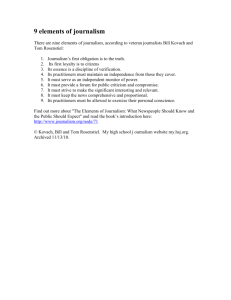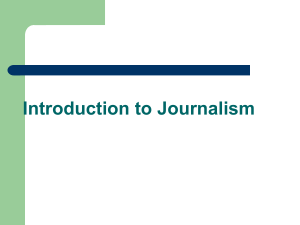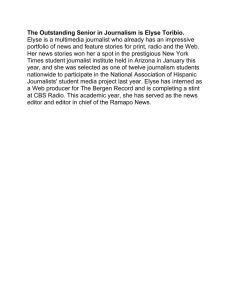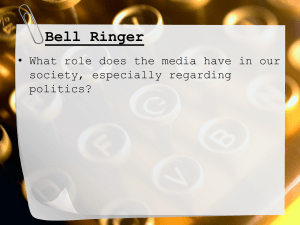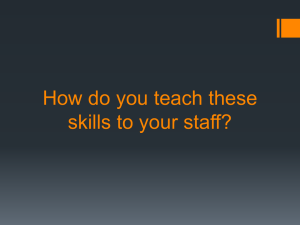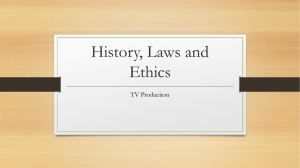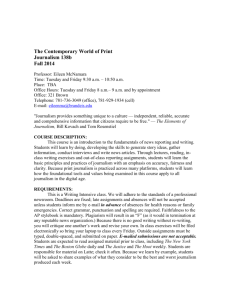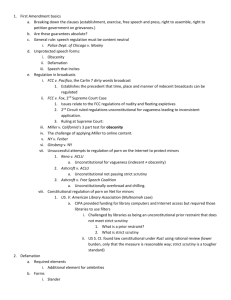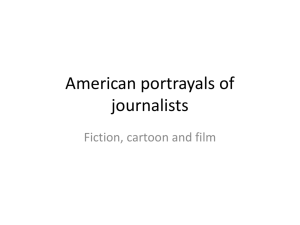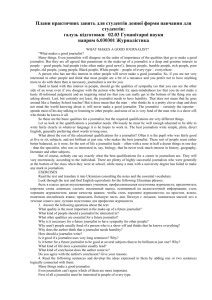Key Concepts Media pdf
advertisement
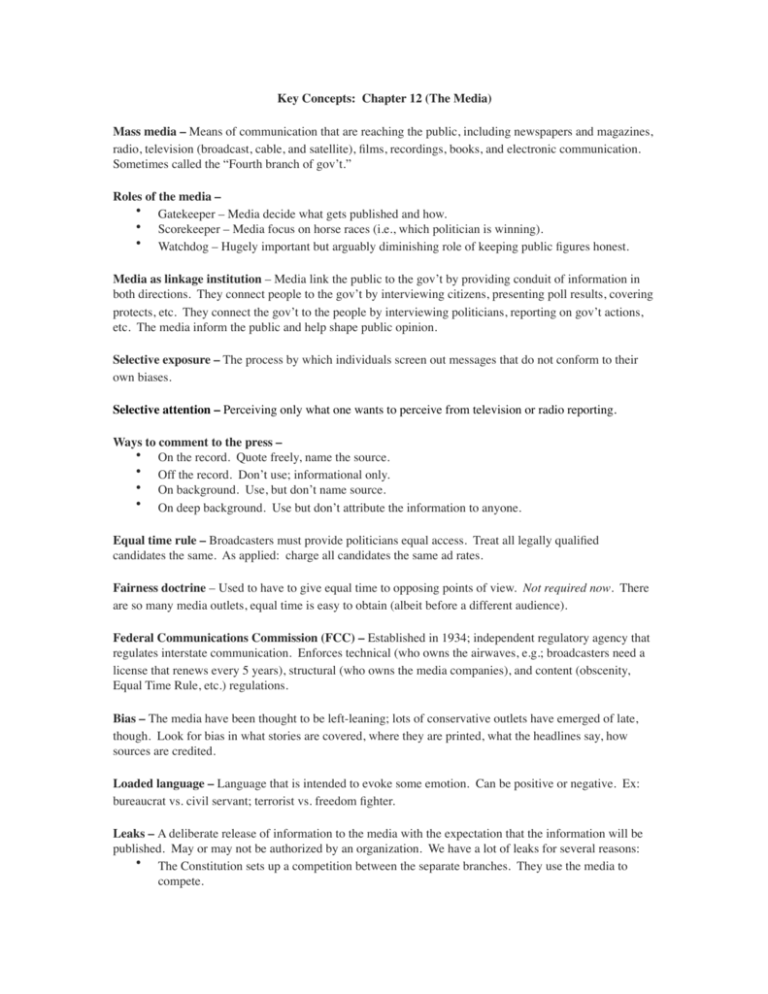
Key Concepts: Chapter 12 (The Media) Mass media – Means of communication that are reaching the public, including newspapers and magazines, radio, television (broadcast, cable, and satellite), films, recordings, books, and electronic communication. Sometimes called the “Fourth branch of gov’t.” Roles of the media – • Gatekeeper – Media decide what gets published and how. • Scorekeeper – Media focus on horse races (i.e., which politician is winning). • Watchdog – Hugely important but arguably diminishing role of keeping public figures honest. Media as linkage institution – Media link the public to the gov’t by providing conduit of information in both directions. They connect people to the gov’t by interviewing citizens, presenting poll results, covering protects, etc. They connect the gov’t to the people by interviewing politicians, reporting on gov’t actions, etc. The media inform the public and help shape public opinion. Selective exposure – The process by which individuals screen out messages that do not conform to their own biases. Selective attention – Perceiving only what one wants to perceive from television or radio reporting. Ways to comment to the press – • On the record. Quote freely, name the source. • Off the record. Don’t use; informational only. • On background. Use, but don’t name source. • On deep background. Use but don’t attribute the information to anyone. Equal time rule – Broadcasters must provide politicians equal access. Treat all legally qualified candidates the same. As applied: charge all candidates the same ad rates. Fairness doctrine – Used to have to give equal time to opposing points of view. Not required now. There are so many media outlets, equal time is easy to obtain (albeit before a different audience). Federal Communications Commission (FCC) – Established in 1934; independent regulatory agency that regulates interstate communication. Enforces technical (who owns the airwaves, e.g.; broadcasters need a license that renews every 5 years), structural (who owns the media companies), and content (obscenity, Equal Time Rule, etc.) regulations. Bias – The media have been thought to be left-leaning; lots of conservative outlets have emerged of late, though. Look for bias in what stories are covered, where they are printed, what the headlines say, how sources are credited. Loaded language – Language that is intended to evoke some emotion. Can be positive or negative. Ex: bureaucrat vs. civil servant; terrorist vs. freedom fighter. Leaks – A deliberate release of information to the media with the expectation that the information will be published. May or may not be authorized by an organization. We have a lot of leaks for several reasons: • The Constitution sets up a competition between the separate branches. They use the media to compete. • Adversarial press: politicians and press don’t trust each other; press always looking for a leak of the “real” story. Trial balloon – Leaking information to the media for publication to see how the public will react. Impact of the Internet on politics – • Low cost of publishing and more sophisticated data mining allows “narrowcasting” – targeting • • • • specific groups with messages tailored to them. Makes raising small sums of money easier. Easier now to organize activists, voters (and opponents) Easy to get a quick (though unreliable) read on public sentiment A forum for analysis (of a sort; much garbage published too) Impact of media on “candidate-centered campaigns” – Campaigns are becoming more focused on the candidate and less on the issues. The media contribute to this by • Replacing speeches with sound bites • Focusing on mistakes, negative news • Horse-race journalism Horse race journalism – Keeping the focus of reporting on who is ahead and by how much rather than on substantive differences between the candidates. Sound bite – A short phrase intended to communicate a point in a way that grabs the attention and is memorable. Prior restraint – Prohibiting the publication of something (a/k/a censorship). This is generally prohibited. Exceptions, though, for obscenity and information that threatens our national security (see Near v. Minnesota (politician tried to get a “gag order” preventing the publication of a story critical of him; Court refused to grant the gag order); NYT v. U.S. (Pentagon Papers case; court allowed NYT to publish story critical of our involvement in Viet Nam). Libel – written defamation of character (contrast slander, which is oral defamation). Cannot restrain publication of libelous material but can sue for damages after it’s published. Development of journalism – • Party press. Did the bidding of politicians. • Popular press. News services tried to cater to widest possible audience. Full of “yellow journalism” (full of scandals and gossip; little news). • Magazines of opinion (muckraking era) • Electronic journalism – TV and radio. • Internet. (See impact of Internet on politics, above.) Adversarial press – The suspicious nature of the national press toward public officials. Attack journalism – The current era of media coverage that seizes upon any bit of information or rumor that might call into question the qualifications or character of a public official. Background story – (news) A tactic by government officials to win journalistic friends. The official purportedly explains current policy on condition that the source of the information not be identified by name. Confidentiality – Reporters' keeping sources of their stories secret. Most states and the federal government allow courts to decide whether the need of a journalist to protect sources outweighs the interests of the government in gathering evidence in a criminal investigation. Shield law – a law that allows a reporter to protect the identity of his/her sources. These laws typically require a balancing of needs: does the government’s need for information (perhaps, for instance, in a criminal investigation) outweigh the need for the journalist to keep identity of sources confidential. Feature stories – A type of news story that involves a public event not routinely covered by reporters and that requires a reporter to take initiative to select the story and persuade an editor to run it. Insider stories – A type of news story that involves information not usually made public which requires investigative work on the part of a reporter or a leak by some public official. Muckracker A journalist who investigates the activities of public officials and organizations, especially business firms, seeking to expose and publicize misconduct or corruption. Political editorializing rule – A regulation of the FCC providing a candidate with the right to respond if a broadcaster endorses the opposing candidate. Right-of-reply rule – A regulation by the FCC permitting a person the right to respond if attacked on a broadcast other than in a regular news program.
